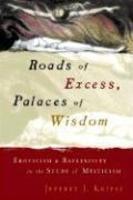
Book Summary
William Blake once wrote that "the road of excess leads to the palace of wisdom." Inspired by these poetic terms, Jeffrey J. Kripal reflects on how the modern study of mysticism has often been inspired by the mystical experiences of the scholars themselves. More specifically, he suggests, these "roads of excess" are often marked by erotic engagements with text and tradition that carry within themselves important theoretical insights into both the historical mystics and our own critical engagements with their remarkable texts. To explore such possibilities, Kripal takes his readers on a tour of comparative mystical thought in Catholicism, Sufism, Hinduism, Tantra, and Kabbalah by examining the lives and works of five major historians of mysticism: Evelyn Underhill, Louis Massignon, R. C. Zaehner, Agehananda Bharati, and Elliot Wolfson. Kripal also critically analyzes his own mystical experiences in a series of revealing autobiographical essays and concludes the book with seven "palaces of wisdom" that envision the study of mysticism as a mystical phenomenon, with its own unique histories, psychosexual dynamics, ethical disciplines, existential paradoxes, and unitive goals. William Blake once wrote that "The road of excess leads to the palace of wisdom." Inspired by these poetic terms, Jeffrey J. Kripal reveals how the works of scholars of mysticism are often rooted in their own mystical experiences, "roads of excess," which can both lead to important insights into these scholars' works and point us to our own "palaces of wisdom." In his new book, Kripal addresses the twentieth-century study of mysticism as a kind of mystical tradition in its own right, with its own unique histories, discourses, sociological dynamics, and rhetorics of secrecy. Fluidly combining autobiography and biography with scholarly exploration, Kripal takes us on a tour of comparative mystical thought by examining the lives and works of five major historians of mysticism-Evelyn Underhill, Louis Massignon, R. C. Zaehner, Agehananda Bharati, and Elliot Wolfson-as well as relating his own mystical experiences. The result, Kripal finds, is seven "palaces of wisdom": the religious power of excess, the necessity of distance in the study of mysticism, the relationship between the mystical and art, the dilemmas of male subjectivity and modern heterosexuality, a call for ethical criticism, the paradox of the insider-outsider problem in the study of religion, and the magical power of texts and their interpretation. An original and penetrating analysis of modern scholarship and scholars of mysticism, "Roads of Excess, Palaces of Wisdom" is also a persuasive demonstration of the way this scholarly activity is itself a mystical phenomenon.
Book Details
| Book Name | Roads Of Excess, Palaces Of Wisdom: Eroticism And Reflexivity In The Study Of Mysticism |
| Author | Jeffrey John Kripal |
| Publisher | University Of Chicago Press (Dec 2001) |
| ISBN | 9780226453798 |
| Pages | 272 |
| Language | English |
| Price | 1093 |








